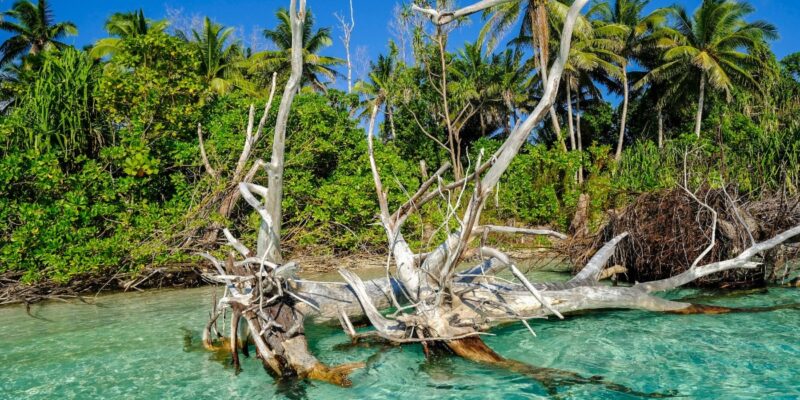
This story was originally published by the Guardian and is reproduced here as part of the Climate Desk collaboration.
In a landmark hearing, small island nations disproportionately affected by the climate crisis are taking on high-emitting countries in a court in Hamburg, Germany, in what is being seen as the first climate justice case aimed at protecting the ocean.
During the two-day hearing, which commenced on Monday, the nations—including the Bahamas, Tuvalu, Vanuatu, Antigua and Barbuda among others—will ask the International Tribunal for the Law of the Sea to determine whether greenhouse gas emissions absorbed by the marine environment should be considered pollution.
As one of the planet’s greatest carbon sinks, the ocean absorbs 25 percent of carbon dioxide emissions, captures 90 percent of the heat caused by those emissions, and produces half the world’s oxygen. Most countries have obligations under the legally binding UN convention on the law of the sea to take measures to prevent, reduce and control marine pollution.
If the case, brought by the Commission of Small Island States on Climate Change and International Law (COSIS), is successful, these obligations would include carbon-emission reduction and protection of marine environments already damaged by CO2 pollution.
The states hope it will provide guidance to countries on the emission reductions necessary to meet their commitments under the Paris climate agreement to prevent temperatures rising 1.5 C above pre-industrial levels. In May, scientists warned the world is likely to breach the 1.5 C target by 2027.
“Sea levels are rising rapidly, threatening to sink our lands below the ocean,” Kausea Natano, the prime minister of Tuvalu, said in a statement. “Extreme weather events, which grow in number and intensity with each passing year, are killing our people and destroying our infrastructure. Entire marine and coastal ecosystems are dying in waters that are becoming warmer and more acidic.”
His people are suffering a “manifest injustice” as a result of climate change, he said. “We are confident that international courts and tribunals will not allow this injustice to continue unchecked.”
Half of Tuvalu’s capital, Funafuti, will be flooded by 2050, estimates suggest.
While the Paris agreement is a legally binding treaty requiring countries to reduce emissions and affirms the goal of limiting the global temperature rise to below 2 C, it allows countries to set their own action plans. “There are no obligations to keep temperature rise to within 1.5 C, beyond which there is a high probability of catastrophic climate change,” said Payam Akhavan, lead counsel and chair of COSIS’s committee of legal experts.
The case will use the principle of transboundary harm, said Akhavan. “What’s the difference between having a toxic chimney spewing across a border to carbon dioxide emissions?”
“Some of these states will become uninhabitable in a generation and many will be submerged under the sea,” Akhavan added. “This is an attempt to use all the tools available to force major polluters to change course while they still can.”















